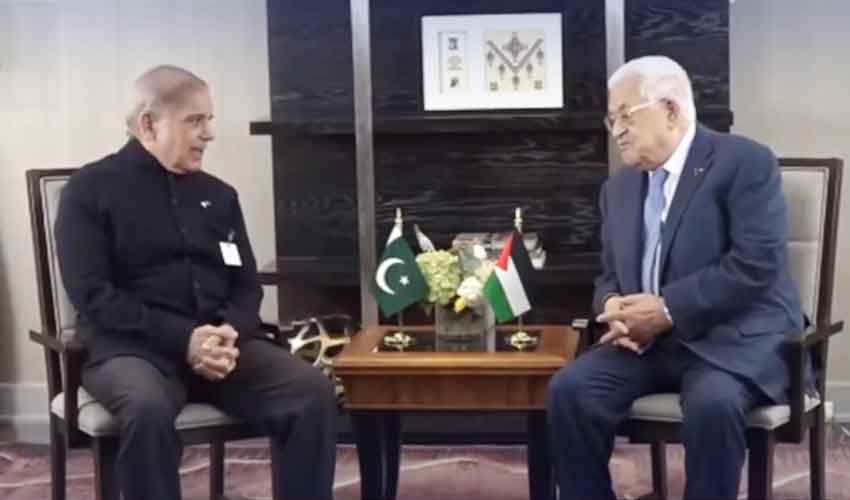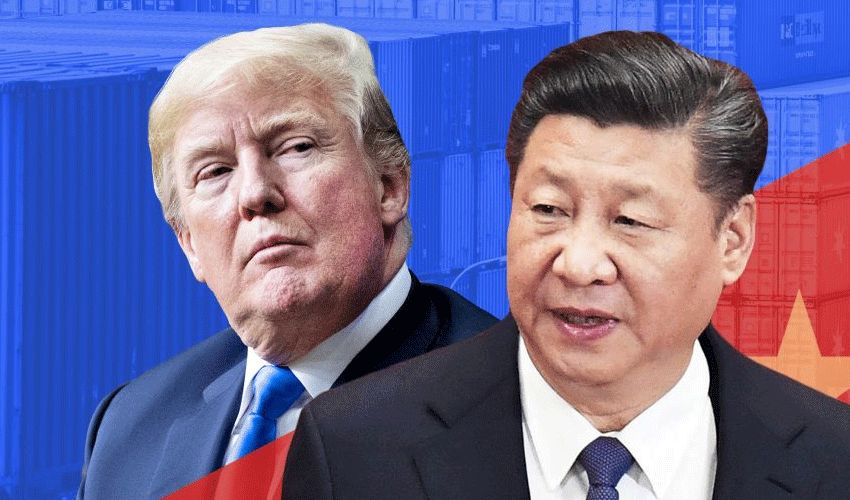Prime Minister Shehbaz Sharif on Thursday strongly condemned the ongoing atrocities committed by Israeli forces against the Palestinian people, calling upon the international community to unite and demand an immediate ceasefire and the creation of an independent state of Palestine.
Speaking to reporters alongside Palestinian President Mahmoud Abbas on the sidelines of the 79th Session of the United Nations General Assembly (UNGA), Sharif emphasized that peace would not return to the region unless the world came together to push for a Palestinian state.
"The time has come when we all must come together and demand an immediate ceasefire and the creation of the State of Palestine. Without that, peace will not return to this part of the world. If this is allowed to linger on, things will become very, very tense," he warned.
The PM reiterated Pakistan’s solidarity with the Palestinian people, expressing outrage at the atrocities and genocide committed by Israel in Gaza.
"I am here to convey the feelings of the people of Pakistan that our hearts beat together. We strongly condemn this barbaric act," Sharif said. He highlighted that over 41,000 Palestinians had been killed in the past year, with cities, towns, schools, hospitals, and vital infrastructure reduced to rubble.
Sharif praised the resilience of the Palestinian people, stating that their sacrifices and patience would not be in vain. "Their bravery will result in the eventual creation of the State of Palestine," he said.
Pakistan’s support for Palestine
Palestinian President Mahmoud Abbas, during the press conference, lauded Pakistan’s longstanding support for the Palestinian cause. Abbas noted that Pakistan had consistently stood by Palestine since before 1948, providing diplomatic and humanitarian assistance to the Palestinian people.
"Pakistan’s unwavering position on Palestine is not just limited to supporting students but is reflected in its stance at international forums as well," Abbas said.
Call for UN sanctions against Israel
Earlier on Wednesday, during the High-Level Open Debate of the UN Security Council on 'Leadership for Peace', Sharif urged the international body to impose sanctions on Israel, including an arms and trade embargo, for its genocidal acts against Palestinians.
"We must compel Israel to halt its genocidal war in Gaza and prevent its attempts to provoke a wider conflict in the Middle East," he stated. Sharif also condemned Israeli bombings in Lebanon, urging accountability for Israel's crimes against both Palestinian and Lebanese civilians.
Sharif stressed that the Security Council must urgently develop an impartial plan for a ceasefire and a peaceful resolution to the Israel-Gaza conflict. He also addressed other global challenges, including the war in Ukraine, escalating tensions between great powers, and growing global poverty, which he said threatened the foundations of world peace.
Other global issues
Sharif took the opportunity to raise other pressing international issues, including the Kashmir conflict. He called on the Security Council to implement resolutions demanding a plebiscite for self-determination in Jammu and Kashmir. "The council can no longer ignore the simmering issue of Kashmir, which poses a great threat to international peace and security," he said, highlighting the massive violations of fundamental rights in the region.
The prime minister also urged the Council to address the resurgence of terrorism, particularly from Afghanistan, and provide active support to African nations in combating terrorism and foreign interventions.
Sharif’s day at the United Nations headquarters was packed with meetings, including discussions with financial institutions like the International Monetary Fund (IMF) and the World Bank. Speaking to the media, he expressed gratitude for the recent approval of Pakistan’s IMF program, stressing the need for unity to make the program a success. He noted that the IMF delegation had appreciated the efforts of his government, and expressed optimism about future cooperation with the World Bank to improve the economic condition of the people of Pakistan.
Regarding the Gaza conflict, Sharif condemned the ongoing violence, calling it "the worst massacre in history" and urged immediate international action to implement a ceasefire.


























